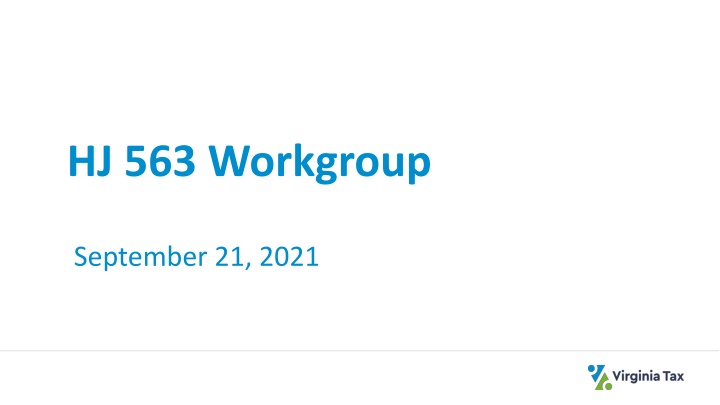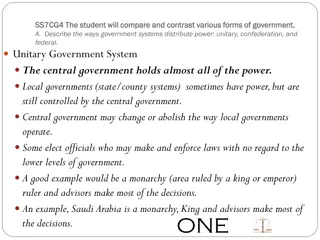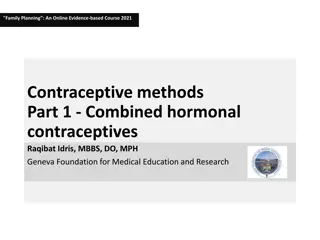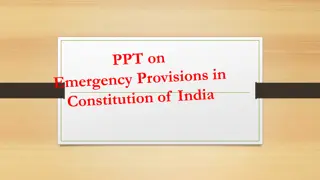Update on Unitary Combined Reporting Requirement
Reporting requirement budget requirement Item 3-5.23 of the 2021 Appropriation Act mandates corporations part of a unitary business to submit an informational report to Virginia Tax based on Taxable Year 2019 data by December 1, 2021. The process involves data elements, report submissions, adjustments, validation, and impact analysis on corporations.
Download Presentation

Please find below an Image/Link to download the presentation.
The content on the website is provided AS IS for your information and personal use only. It may not be sold, licensed, or shared on other websites without obtaining consent from the author.If you encounter any issues during the download, it is possible that the publisher has removed the file from their server.
You are allowed to download the files provided on this website for personal or commercial use, subject to the condition that they are used lawfully. All files are the property of their respective owners.
The content on the website is provided AS IS for your information and personal use only. It may not be sold, licensed, or shared on other websites without obtaining consent from the author.
E N D
Presentation Transcript
HJ 563 Workgroup September 21, 2021
Update: Unitary Combined Reporting Requirement
Reporting Requirement Budget Requirement (Item 3-5.23) Item 3-5.23 of the 2021 Appropriation Act required corporations that are part of a unitary business to submit an informational report to Virginia Tax based on Taxable Year 2019 data Banks and insurance companies not subject to the reporting requirement Report was due July 1, 2021; no due date extensions permitted Virginia Tax must submit a report to the chairmen of the money committees by December 1, 2021 summarizing the data
Reporting Requirement Data Elements Report submitted by a designated corporation for each unitary business Reported information about the unitary group s income, apportionment computation, tax credits, and tax liability calculation Prepared calculations under both the Joyce and Finnigan approaches Provided information about calculations under the current filing requirements for all members of the unitary group that have nexus with Virginia In-state unitary businesses were exempt from the filing requirement
Reporting Requirement Preliminary Statistics on Report Submissions Category Number of Reports Total Reports Submitted 11,015 Adjustments 1,697 Total After Adjustments 9,318 Validated Reports 7,926 Remaining Reports to be Validated 1,392
Reporting Requirement Validation Process Adjustments were made for the following: Duplicate reports Reports missing crucial information (such as the calculations of tax liability under Joyce and Finnigan) Reports that could be matched to actual TY 2019 Virginia corporate income tax returns were validated to the extent possible The remaining reports to be validated did not match actual Virginia income tax return information and require additional research/validation
Reporting Requirement Preliminary Analysis of Impact to Corporations Of the 7,926 reports that have been validated, below is a summary of the percentage of corporations that are estimated to have a change in tax liability (before tax credits): Change in Tax Liability Percentage No Change 73% Increase in Tax Liability (Losers) 13% Decrease in Tax Liability (Winners) 14%
Reporting Requirement Data Limitations Revenues would depend in part on how the law is structured; legislative policy may vary from the assumptions utilized in reports submitted Reference Guide addressed some policy issues, but did not address every scenario and different companies may have reasonably applied different assumptions Factors such as the intangible holding company ( IHC ) addition may result in distortions, since reporting an IHC addition under combined reporting may result in accounting for the impact twice Estimates will be based on one year of information (TY 2019); actual impact could vary due to volatility of the corporate income tax Data collected was provided by taxpayers and not subject to more detailed verification/audit
Reporting Requirement Next Steps Complete the validation process Aggregate the information in summary fashion, showing the potential impact of both the Joyce and Finnigan methods Publish the final report for submission to the Chairmen of the House Finance, House Appropriations, and Senate Finance & Appropriations Committees
Issues Related to Unitary Combined Reporting
Summary of Combined Reporting Issues Potential impact of optional unitary combined reporting Forced combination (North Carolina) Joyce v. Finnigan methods for business apportionable income Transitional issues related to deferred gains or losses Potential resource needs, particularly for compliance and appeals Revenue stability
Optional Unitary Combined Reporting Virginia s Current Reporting Requirement Every corporation that is incorporated in Virginia, has registered with the State Corporation Commission for the privilege of conducting business in Virginia, or receives income from Virginia sources is required to file a Virginia corporate income tax return An affiliated group of corporations is permitted to elect to file in one of the following three ways: (i) separately, (ii) on a consolidated basis, or (iii) using a Virginia combined return
Optional Unitary Combined Reporting Election for Unitary Combined Reporting Unitary combined reporting would represent a new Virginia reporting method States that have enacted this method of reporting have generally made it mandatory, by repealing alternative methods of reporting while also allowing a consolidated return election, which has similar safeguards against income-shifting Allowing unitary combined reporting to be optional, while also maintaining the ability to opt into the existing methods of reporting would result in taxpayers electing to utilize the method that is the least burdensome from a tax perspective This would result in an overall revenue loss, since Virginia would lose revenue from affiliated groups that would benefit from unitary combined reporting, while not gaining revenue from those that would pay increased taxes
North Carolina Forced Combination General Information North Carolina is a separate entity state and does not generally permit corporations to file consolidated returns When the North Carolina Department of Revenue (DOR) has reason to believe that corporation fails to accurately report net income attributable to business in NC through use of intercompany transactions that lack economic substance or are not at fair market value, DOR may request information to substantiate intercompany transactions
North Carolina Forced Combination Required Adjustments Based on response, DOR may make adjustments, including: Disallowing deductions in whole or in part, Attributing income to related corporations, Disregarding transactions, or Reclassifying income as apportionable or allocable If such adjustments are deemed inadequate, DOR can require the corporation to file a return that reflects the North Carolina income on a combined basis of all members of its affiliated group that are conducting a unitary business
Joyce vs. Finnigan Apportioning a Unitary Group s Business Apportionable Income Two approaches: Joyce Nexus determinations are made at the level of each individual entity, so sales by an entity without Virginia nexus are excluded from the sales factor numerator Finnigan Nexus determinations are made at the level of the unitary combined group as a whole, so sales by all members of the group attributable to Virginia are included in the sales factor numerator, even for entities that would lack Virginia nexus if filing on a separate entity basis Finnigan is considered to be the more aggressive approach, but is increasingly the method being adopted by unitary combined reporting states
Transitional Issues - Deferred Gain or Loss Basis and Depreciation Federal regulations defer recognition of certain gains and losses Gains and losses will be deferred for asset transactions among affiliates in a consolidated federal return Previously deferred gain or loss will be recognized when the asset is sold to an entity not included in the consolidated federal return Recognition of gain or loss affects basis of asset and subsequent depreciation Subsequent depreciation unchanged on consolidated return when gain or loss is deferred, but each corporation may maintain its own records Recognition of gain or loss will affect basis and subsequent depreciation amounts and asset life
Transitional Issues - Deferred Gain or Loss Impact on Virginia Return A corporation is treated as outside the federal consolidated group: When the group elects to file a combined or separate Virginia return When the group elects to file a consolidated Virginia return, but not all of the affiliates have nexus with Virginia Virginia corporate returns often have gain, loss, basis and depreciation that differ from federal return Corporations often prepare a pro-forma federal return for Virginia purposes that assumes that the federal return was based on the same filing method as Virginia (separate, or consolidated with the same affiliates)
Transitional Issues - Deferred Gain or Loss Implementation of Unitary Combination Unitary combination is generally treated the same as federal consolidation Most states use federal consolidated return regulations for accounting adjustments among corporations included in a state unitary combined return Thus, gain or loss would be deferred for asset transactions with other corporations included in the unitary combined return; however, gain or loss (including deferred gain/loss) would be recognized for asset transactions with other corporations that are not included in the unitary combined return A transitional adjustment may be required when corporations are first included in a unitary combined return - corporations included in a federal return but not in a Virginia consolidated return may have deferred gains or losses that must be restored when included in a unitary combined return
Resource/Auditing Issues Resource Needs Start Up Costs and Staffing Minimum estimated costs of $700,000 in the initial year of implementation and more than $400,000 annually thereafter Upfront costs would include changes to systems and forms; ongoing costs would include hiring additional staff Like revenues, costs would likely depend in part on how the law is structured Sufficient time would be necessary to develop regulatory guidance, generate new forms, inform taxpayers, and adequately train staff
Resource/Auditing Issues Resource Needs Compliance and Appeals In addition to minimum costs, additional costs would include training, development of guidance, staffing to support compliance efforts, and increased volume of appeals/rulings Resource needs for auditors would depend on how the law is structured and the specific changes made to the current corporate income tax reporting regime Similarly, resources may be necessary for an increased volume of appeals, rulings, and litigation resulting from various policy issues associated with the change
Revenue Stability Potential Revenue Issues Any revenue estimates should be considered tentative/preliminary Actual impact would depend on how the law is structured and individual circumstances of the impacted corporations Volatility of the corporate income tax impacts not only the reliability of revenue estimates, but also the actual impact each year Initial revenues could be affected by taxpayer compliance and establishment of any necessary administrative guidance Like many major tax changes, any positive revenue impact would likely be less in the transitional years due to taxpayer compliance
Other Potential Corporate Income Tax Policy Changes
Summary of Other Corporate Income Tax Issues Switching an affiliated group s filing election Changing Virginia s three-factor apportionment method Market-based sourcing Tracking federal consolidated return calculations Business interest expense limitation Net operating losses Intangible holding company addback Nexus considerations
Switching an Affiliated Groups Filing Election General Rule The Department has the statutory authority to grant or deny requests by corporations to change their Virginia tax filing status Because switching to/from the consolidated filing status affects the allocation and apportionment formulas and may distort the business done in Virginia and the income arising from activity in Virginia, the Department generally will not grant permission to change to/from a consolidated filing status, absent extraordinary circumstances In contrast, separate and Virginia combined returns do not affect the allocation and apportionment formulas for each corporation; therefore, permission to change from separate to Virginia combined returns or from Virginia combined to separate returns is generally granted
Switching an Affiliated Groups Filing Election 20-Year Rule During the 2003 Session, the General Assembly enacted legislation that effectively provided an exception to the general rule against switching to/from consolidated This provided that an affiliated group that has filed on the same basis for at least the last 20 years may switch to/from consolidated if they ask permission and it is determined that: For the year preceding the year for which the new election would be applicable, there would have been no decrease in tax computed under the new filing method as compared to old filing method; and The affiliated group agrees to pay the greater of the tax under the old filing method and the new filing method for the taxable year in which the new election is effective and for the immediately succeeding taxable year
Switching an Affiliated Groups Filing Election 2020 Proposed Legislation During the 2020 Session, 2020 SB 1058 was introduced to make it simpler for certain affiliated groups to switch to/from consolidated The federal Tax Cuts and Jobs Act made several important changes to business taxation, including imposing a business interest limitation The bill was intended to permit switching of certain affiliated groups filing elections because of the tax consequences of such changes It is the Department s understanding that the bill was not enacted due to its unknown and potentially significant revenue impact
Changing Virginias Three Factor Apportionment Virginia s Current Apportionment Structure Most corporations are required to use Virginia s statutory method of apportionment to determine the amount of income that is subject to Virginia income taxation The statutory method of apportionment generally consists of three factors: Property: Value of property in Virginia divided by the value of property everywhere Payroll: Compensation paid to employees in Virginia divided by compensation paid everywhere Sales: Sales (gross receipts) made in Virginia divided by sales everywhere. The sales factor is double weighted
Changing Virginias Three Factor Apportionment Special Apportionment Methods For certain taxpayers, Virginia permits or requires the use of special apportionment methods that differ from the statutory three factor apportionment method Virginia law includes special apportionment methods for certain industries, including: financial corporations, construction contractors, motor carriers, and railway companies In 2018, the General Assembly authorized certified company apportionment for companies operating in certain disadvantaged localities (administered by VEDP) Virginia also allows companies to request an alternative method of apportionment in situations where the statutory three-factor apportionment method is inapplicable or inequitable
Changing Virginias Three Factor Apportionment Single-Sales Factor Another alternative to Virginia s statutory three factor method of apportionment is the single-sales factor method of apportionment Under single-sales factor apportionment the share of a corporation s total profit that is taxed in Virginia is based solely on the share of the corporation s sales occurring in Virginia as compared to sales everywhere The General Assembly has enacted single-sales factor methods for: Manufacturers (elective - 2009) Retailers (2012) Enterprise data centers (2015) and Debt buyers (in combination with market-based sourcing - 2018)
Market-Based Sourcing Virginia s Current Apportionment Structure How Sales Are Assigned Sales of tangible personal property: In Virginia if delivered to a location in Virginia Outside Virginia if delivered to a location outside of Virginia Sales of services or intangible property: In Virginia if the greater portion of income producing activity (measured by costs of performance) is in Virginia Outside Virginia if the greater portion of income producing activity (measured by costs of performance) is outside of Virginia
Market-Based Sourcing Virginia s Current Apportionment Structure Cost of Performance Cost of performance is an all-or-nothing determination for purposes of sourcing sales of services and intangible property For example, a company with facilities in all 50 states and only 5% of its costs in Virginia would assign 100% of its sales of services and intangible property to Virginia if no other state had more than 5% The income producing activity and costs of performance are deemed performed at the location of the corporation s real and tangible property and its employees Virginia s statutory definition of the sales factor for services and intangible property is consistent with Section 17 of UDITPA and regulations promulgated by the MTC Until recently, the majority of states used the cost of performance method
Market Based Sourcing What is Market-Based Sourcing? An alternative method for determining the sales factor for sales other than sales of tangible personal property (services and intangible property) Under market-based sourcing, sales of services and intangible property are sourced to a state if the taxpayer s market for such sales is in that state The method for determining a taxpayer s market for a sale of services or intangible property varies between the states The general rule is to source intangible property to a state to the extent such property was used in that state, but the specific rules for each state may be much more complicated
Market Based Sourcing Proposed Legislative Changes Since 2011, the General Assembly has considered several market-based sourcing bills: 2011 House Bill 1604 & Senate Bill 1006 2013 House Bill 2253 2014 House Bill 442 2015 House Bill 2233 2016 House Bill 966 2017 House Bill 1499 2018 House Bill 798 (enacted limited to debt buyers only) 2020 House Bill 796
Market Based Sourcing Proposed Legislative Changes In 2015, Virginia Tax conducted a market-based sourcing study upon request of the Chairman of House Finance The study included meetings with tax practitioners, business representatives, and other stakeholders The results of such study were inconclusive due to limited data Introduced budget in 2016 included language that would have allowed Virginia Tax to collect data from corporations to generate a more accurate revenue estimate Funding included to pay each reporting entity $2,500 Proposal not adopted by the General Assembly In 2018, House Bill 798 enacted market based sourcing for debt buyers
Tracking Federal Consolidated Return Calculations Current Law For federal income tax purposes, an affiliated group of corporations has the option of filing a consolidated return in lieu of separate returns for each corporation If a federal consolidated return is filed, the affiliated group members are treated as one entity and their financial activities are combined Similarly, Virginia also allows for the filing of a state consolidated return in lieu of separate returns for each corporation A Virginia consolidated return election can be made, regardless of how the federal return was filed
Tracking Federal Consolidated Return Calculations Current Law (Continued) Virginia generally follows the federal regulations for consolidated groups As a result, taxpayers that file consolidated federal and state returns may use federal computations of income and deductions to determine their state income tax, unless a specific state deconformity provision applies However, Virginia only allows corporations that have nexus with Virginia to be included on the state consolidated return This means that taxpayers may need to re-compute income and deductions for state purposes to exclude non-nexus entities included on the federal consolidated return that cannot be included on the state return
Tracking Federal Consolidated Return Calculations Potential Changes Virginia law could be amended to allow non-nexus affiliates be included or to require the inclusion of all affiliates on consolidated returns The advantages include that the Virginia consolidated group: Would more closely resemble the federal consolidated group If Virginia became a unitary combined state with a consolidated election, would more closely resemble the unitary combined group The disadvantages of such approach include: There would be transition issues that would need to be addressed It is unclear how the transition would affect General Fund revenues
Business Interest Expense Limitation Business Interest Expense Limitation - IRC 163(j) Under the TCJA, the deduction for business interest is generally limited to 30% of the taxpayer s income for the taxable year Interest expenses not deductible on account of this limitation are permitted to be carried forward indefinitely, subject to certain restrictions In the case of a group of affiliated corporations that file a federal consolidated return, the limitation applies at the consolidated tax return filing level During the 2019 Session, legislation was enacted that generally conforms Virginia to the TCJA, including the limitation on the deductibility of business interest. Such legislation also enacted a deduction equal to 20% of the amount of business interest that is disallowed as a deduction under the IRC 163(j) limitation
Business Interest Expense Limitation Budget Language Item 272(E) of the 2019 Appropriation Act During the 2019 Session, the Virginia General Assembly enacted budget language that required the Department to convene a working group to study the impact of the business interest limitation on businesses that are part of an affiliated group and file a Virginia combined or consolidated returns On May 20, 2019, the Department held a working group meeting and solicited comments from affected parties The budget language also required the Department to publish guidelines regarding how taxpayers are required to account for the business interest limitation for Virginia income tax purposes
Business Interest Expense Limitation Current Guidelines and Additional Considerations In 2019, the Department issued guidelines that require the business interest limitation be computed based upon how taxpayers elected to file their Virginia tax return This is consistent with how Virginia treats other federal deductions, such as the federal charitable contribution deduction and the federal NOL deduction Differences between federal and Virginia limitations arise from groups that file a federal consolidated return but either file: Separate or combined Virginia returns, or A consolidated Virginia return that has different members for federal and Virginia purposes
Business Interest Expense Limitation Current Guidelines and Additional Considerations Options to address this issue: Changes to Virginia s current filing methods Adoption of mandatory unitary combined with a Virginia consolidated return election, where the members of such return would be the same as the federal consolidated return However, such changes could have a negative revenue impact, and the fiscal implications should be carefully considered before making any changes
Net Operating Loss Deduction Deconformity from Federal NOL Enhancements Virginia has a long-standing history of deconforming from provisions enhancing NOLs, such as the 5-year carryback of certain NOLs generated in Taxable Years 2001, 2002, 2008, and 2009 During the 2019 Session, Virginia conformed to the provisions eliminating NOL carrybacks, allowing unlimited NOL carryforwards, and limiting NOLs to 80% of taxable income During the 2021 Session, Virginia deconformed from the provisions allowing 5-year NOL carrybacks for those incurred in 2018, 2019, and 2020, and removing the 80% limitation Conformity to such provisions would have a significant negative revenue impact
Intangible Holding Company Addback General Overview In 2004, Virginia adopted a statutory addition to federal taxable income for royalty payments and similar expenses paid to an Intangible Holding Company ( IHC ) This addback is intended to mitigate the impact of a tax planning structure that sheltered income by setting up an IHC in a state without a tax on such income: The IHC licenses the intangible property to the Taxpayer, which continues to use Taxpayer pays a royalty to the IHC, which is deductible from state income tax The IHC usually has no significant expenses Taxpayer receives almost all of its royalty payments back as dividend income, which is generally exempt from state income tax
Intangible Holding Company Addback IHC Addback and Unitary Combined Reporting If Virginia adopts unitary combined reporting, the IHC addback may no longer be necessary to prevent this tax planning structure because the IHC would likely be included in the Virginia unitary combined return Because Virginia already has an IHC addback, this would partially offset the positive revenue impact of adopting unitary combined reporting However, Virginia may want to consider maintaining an IHC addback under unitary combined reporting to prevent improper income-shifting outside the Virginia unitary combined group, such as to international affiliates
Nexus Considerations Constitutional and Federal Law Restrictions on State Taxation The U.S. Constitution's Commerce and Due Process Clauses are the primary limitations on a state's ability to levy a tax on an out-of-state taxpayer The courts have interpreted these clauses as requiring substantial nexus, which generally means a sufficient connection exists between the taxpayer and the state to allow the state to impose tax In the 2018 Wayfair decision, the U.S. Supreme Court stated that physical presence is not required for substantial nexus and approved of economic nexus Under economic nexus, states typically provide a bright-line test where substantial nexus exists if a taxpayer s annual sales in the state exceed a threshold amount
Nexus Considerations Constitutional and Federal Law Restrictions on State Taxation Certain states have asserted economic nexus over out-of-state taxpayers from the in- state use of intangible property (i.e., trademarks, trade names, etc.). See Geoffrey, Inc. v. South Carolina Tax Commission, S.C. Sup. Ct., 437 SE2d 13; cert. denied, 114 S. Ct. 550 In addition to substantial nexus under the U.S. Constitution, a 1959 federal law referred to as Public Law 86-272 limits a state's ability to levy a tax on an out-of-state taxpayer Such law prevents imposing a net income tax on a taxpayer whose only in-state activity consists of the solicitation of orders for the sale of tangible personal property if the orders are sent out of state for approval and shipped from out-of-state locations Notably, Public Law 86-272 does not apply to sales of services and intangibles; however, Virginia has administratively extended this treatment to services and intangibles























